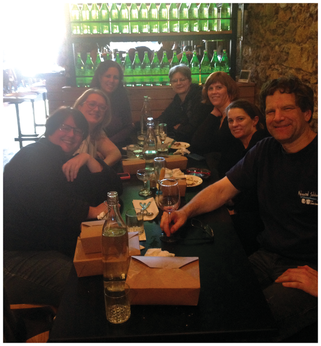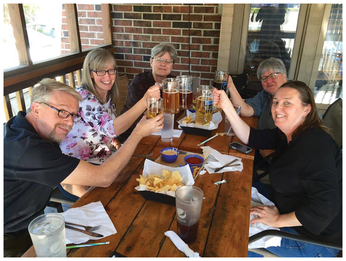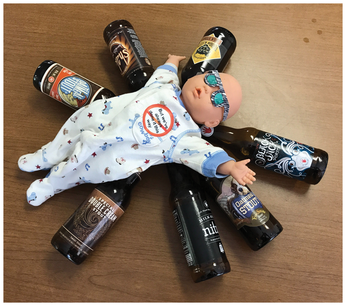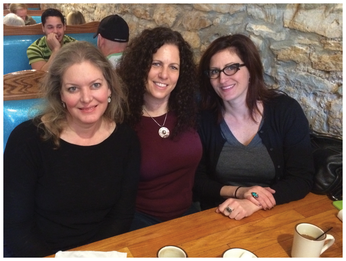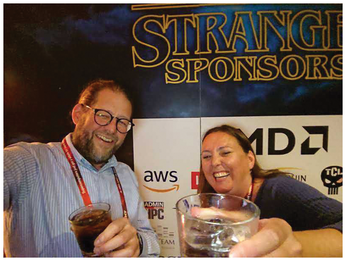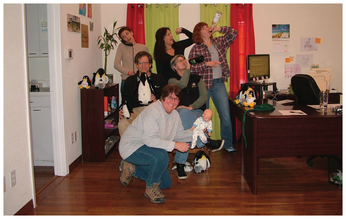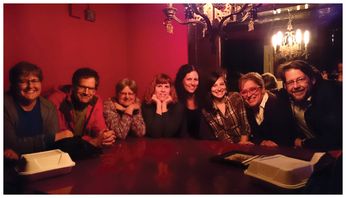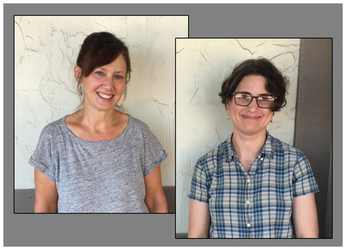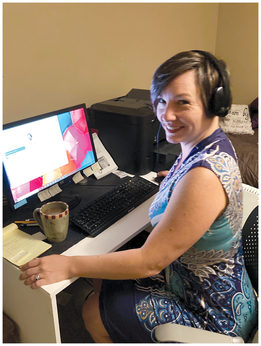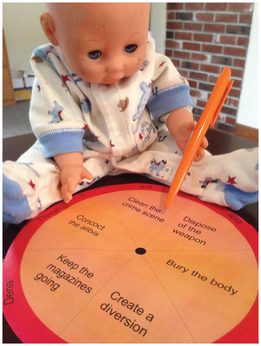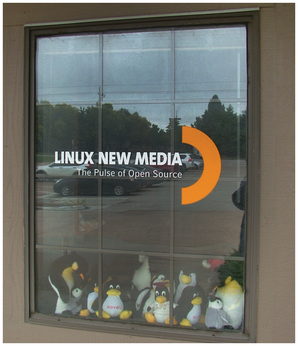Cheers! Celebrating 20 years of Linux Magazine
Cheers! Celebrating 20 years of Linux Magazine
Editor-in-chief Joe Casad reflects on the enchanting 20-year story of Linux Magazine.
I roll out of bed and start the coffee. The dog follows me around, expecting breakfast. I feed him; take a shower. It is still early and the first rays of sunlight are tangled in the trees over my neighbor's house. I pour a cup of coffee and sit at the desk in the small bedroom I use as my office…start my Linux system, call up Slack, check my notes: 9 o'clock Zoom call?
Like many companies around the world, our office has gone all-virtual due to the COVID-19 pandemic. We meet together online once per week for a roundup of company news, but information passes between us all the time, all day, in email, texts, Zoom calls, and posts to workgroups. A publishing office is a frenetic place even on the slow days, and when it gets busy, it is impossible to imagine how it all can stay floating – text files, layout files, emails, author queries, and social media posts fly in every direction, and all the threads converge magically at a sacred moment when we upload the issue to the printer. I'm always amazed when nothing breaks, and the fact that we have smoothly navigated to a remote workday is a testament to our experience, versatility, and espirit de corps. But you see, it hasn't always been so virtual. Most of our years we have worked together face-to-face, and our vibrant office culture has always been a source of pride.
Linux Magazine launched way back in 2000. Our parent company at the time, Linux New Media AG, had been publishing a high-quality Linux magazine in Germany since the very early days of Linux. The founders had a vision for a network of magazines in different languages around the world – an international community like Linux itself – sharing information, expertise, and resources. At one point we had Linux Magazines in German, Polish, Romanian, Spanish, Brazilian Portuguese, and English – all published in tiny offices like ours with small budgets, but all cooperating and making the most of shared resources.
The original English edition was a joint venture with a company in the UK, and the founding editor was Julian Moss. At around the sixth issue, the torch passed to John Southern, who served as editor until I started with Issue 48. Somewhere around Issue 26, the publishing and layout gravitated back to the continent. The English team shared production and marketing resources with the parent company in Munich for a few years, but everyone knew that, when the time was right, they would look for a home in the English-speaking world.
When I first started, I was the only US employee and worked out of my basement in Lawrence, Kansas, editing and coordinating the production with the team back in Munich. The founders had originally wanted to put the U.S. headquarters on one of the coasts – wondering, as do many, what was in between – but the CEO visited Lawrence and quite liked it, conceding that the beer at our local brew pub was more than acceptable to the German palate. (That's a good sign, when people from Munich like your beer.)
Dirty Baby
Our official mascot is a baby doll we found in the fork of a tree one day outside of our office. Dirty baby shows up for all our parties and rarely behaves well. Visit Dirty Baby on Facebook at @itsdirtybaby.
After a couple years of toil, with circulation and ad sales trending up, we had gained enough momentum to open our first office in the US. At first it was just me and distinguished alumna Rikki Endsley, who started as managing editor and then became associate publisher when our publisher, Brian Osborn, a young American ex-pat with an infectious poker face and a rare knowledge of publishing on two continents, took on additional responsibilities at the corporate level. Our office was a one-room space above Buffalo Bob's Smokehouse. We had a big bank of windows that looked out on Massachusetts Street. (The main downtown street in Lawrence is called Massachusetts Street because the town was settled by radical abolitionists from Massachusetts in the 1850s.)
We worked hard, talked about life, and watched a lot of time go by, not just in our lives, but in the evolution of Linux. Our friends in the local publishing community would stop by to see our hip office space. I think they were all a little jealous about our cool gig putting out our own Linux magazine in our funky downtown office. One of the reasons for starting the company in Lawrence was the indigenous reserve of IT-publishing veterans who got their start at local companies like R&D Publications and CMP. Over the years, we've enticed several former co-workers to come and join us.
A couple times a year, Brian would come to town, often on his way to a tech conference or other event, and we would spend a week planning (more like scheming) about where we were going and what dragons we would be hunting next. With each issue, the whole thing felt more like a real company and less like an experiment. Gradually we brought in new services and capabilities, scaling up our operation. We launched our special edition series, added an off-site ad sales team, and increased our involvement with conferences and the open source community. At one particularly surreal moment, we had to occupy a temporary location at the back of the building so they could install a balcony on our office (how often does that happen?). We put out the first edition of The Shell Handbook crammed into a tiny windowless cubicle previously used by a psychotherapist while they crashed down the facade and installed the balcony. The balcony was super cool and made our friends even more jealous, but when our population rose to four in our little one-room space, we knew it was time to find another home.
Our next office was a house converted into an office building that was on a street a couple blocks off the downtown. The building had a big front porch and looked out on a park. The park had a large decommissioned steam locomotive that I could see from my desk at a second-story window. When I was a kid, they let you climb all over that train, poking around and exploring the mechanical crannies. Now there was a big fence around the train, so you couldn't just go poking around on it, but that was OK with me, I often thought, because now I get to poke around on Linux.
We expanded our scope considerably during the train park years, with newsletters, websites, custom content, and lots more stories to tell. Like the time a distributor went bankrupt and left three months of magazines stranded in a warehouse, or the time we were threatened by a patent troll who claimed he had a patent on attaching a DVD to a magazine. And then there was the episode when the DVD company accidentally put a porno film on some of the UK copies of the DVD. We have weathered every crisis together with a rare combination of aptitude and attitude that would be the envy of any small company.
Eventually, the global organization split up, and the English-language operation spun off to become a separate company. It's just us now, although we still collaborate with some of our former international counterparts. We've moved from the train park office to another location in a fancier part of town that isn't quite as bohemian, but it sure is easier to find a parking place.
I'm struck by how much Linux has changed since I started this job – and how the publishing industry has itself remained in a perpetual state of reinvention. It is one thing when the subject of the magazine is continually transforming – and quite another when the very context in which you operate is a moving target. There's no doubt in my mind that the secret to our success is our hard-working team of professionals, who stay calm under pressure and show up every day with ideas and good energy: They never say "no"; they just start thinking about how.
When I look back over my years at Linux New Media, I remember lots of great magazines and lots of grace under fire. I remember fabulous Christmas parties and afternoon escapes to Dempsey's tavern. I recall the kids who have been around the office through the years and adorned our walls with their art – including my own kids, who are now well into their 20s, as well as our pets, and even our parents. Birthday snacks, Valentine cards, meeting-day pizzas, and warm nights watching the 4th of July fireworks from the alley…
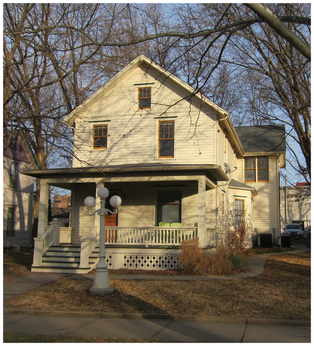 We spent many formative years in our train park office. The ornamental lamp post in front always made me feel like I was crossing the border into Narnia.
We spent many formative years in our train park office. The ornamental lamp post in front always made me feel like I was crossing the border into Narnia.
Through the years, I've had the privilege of watching the rise of the Linux community with a special little community of battle-worn pirates at Linux New Media. Happy 20 years everybody. Here's to 20 more.
Buy Linux Magazine
Subscribe to our Linux Newsletters
Find Linux and Open Source Jobs
Subscribe to our ADMIN Newsletters
Support Our Work
Linux Magazine content is made possible with support from readers like you. Please consider contributing when you’ve found an article to be beneficial.

News
-
Introducing matrixOS, an Immutable Gentoo-Based Linux Distro
It was only a matter of time before a developer decided one of the most challenging Linux distributions needed to be immutable.
-
Chaos Comes to KDE in KaOS
KaOS devs are making a major change to the distribution, and it all comes down to one system.
-
New Linux Botnet Discovered
The SSHStalker botnet uses IRC C2 to control systems via legacy Linux kernel exploits.
-
The Next Linux Kernel Turns 7.0
Linus Torvalds has announced that after Linux kernel 6.19, we'll finally reach the 7.0 iteration stage.
-
Linux From Scratch Drops SysVinit Support
LFS will no longer support SysVinit.
-
LibreOffice 26.2 Now Available
With new features, improvements, and bug fixes, LibreOffice 26.2 delivers a modern, polished office suite without compromise.
-
Linux Kernel Project Releases Project Continuity Document
What happens to Linux when there's no Linus? It's a question many of us have asked over the years, and it seems it's also on the minds of the Linux kernel project.
-
Mecha Systems Introduces Linux Handheld
Mecha Systems has revealed its Mecha Comet, a new handheld computer powered by – you guessed it – Linux.
-
MX Linux 25.1 Features Dual Init System ISO
The latest release of MX Linux caters to lovers of two different init systems and even offers instructions on how to transition.
-
Photoshop on Linux?
A developer has patched Wine so that it'll run specific versions of Photoshop that depend on Adobe Creative Cloud.

